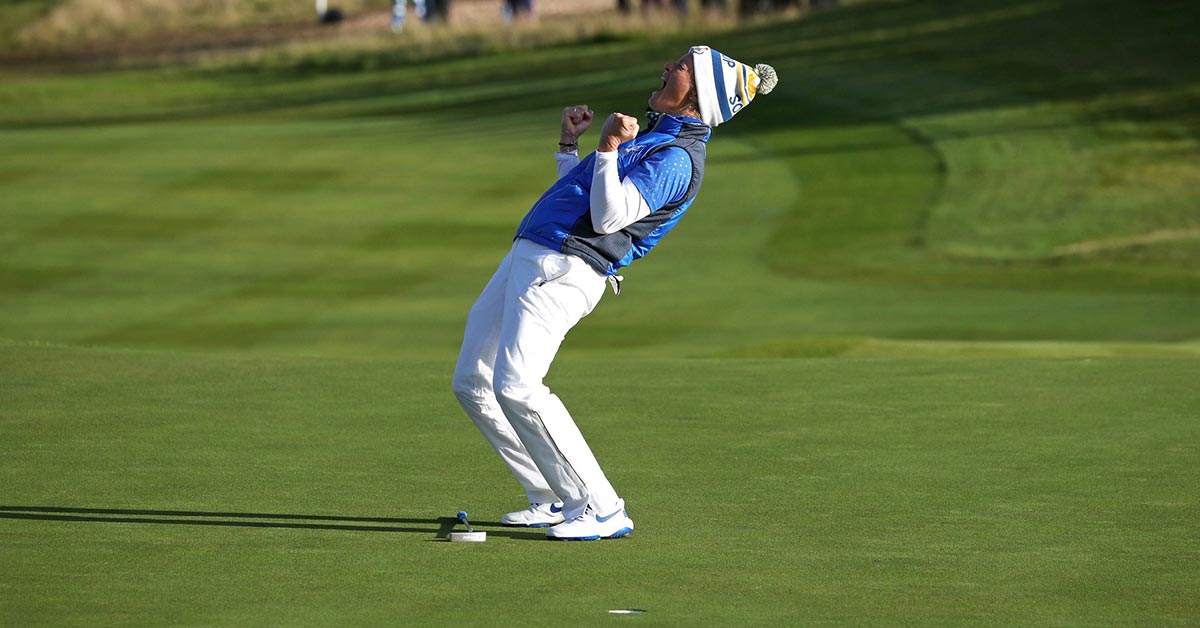Well, we can’t say she didn’t tell us. When Europe’s Catriona Matthew gave one of her four Solheim Cup captain’s picks to Suzann Pettersen – the 635th-ranked player in the world and a woman who had played hardly any golf, competitive or otherwise, in the two years after the birth of her first child – the Scot claimed to have “complete confidence” in the 38-year-old Norwegian.
In the face of much second-guessing, never has such faith been repaid so well.
It came down to this. With the score even at 13½-13½, Pettersen stood over a six-foot putt on the 18th green that would give her a 1-up win over Marina Alex in the last match on the Gleneagles’ Centenary course. Make it and victory in the biennial contest would belong to the Old World team, 14½-13½. Miss it and the overall score would be 14-all, the trophy being retained by its previous holders, the United States.
Pettersen made it, a putt that we’d learn after her post-round announcement that she was retiring, was her final shot as a professional golfer. And one Pettersen hit without knowing exactly the situation she and her side were in.
RELATED: Suzann Pettersen – How to beat your next matchplay opponent
“It’s a dream come true to pull this off here in Scotland, in front of these crowds, for Beany [Matthew’s nickname], here at Gleneagles,” Pettersen said. “It doesn’t get any better. This is a perfect closure – the end for my Solheim career, and also a nice ‘the end’ for my professional career. I’m done. I’m closing it down tomorrow.”
Pettersen’s putt turned out to be the other-worldly climax to Matthew’s masterplan. If Europe, the weaker team in terms of average world ranking, were to win this Solheim Cup it was always going to require big contributions from the 50-year-old Scot’s best players. Which is what she got. Only one of the six golfers she leaned on most heavily left with a record worse than 50 percent.

Celine Boutier and Georgia Hall? Four points each from their four matches.
Charley Hull? Unbeaten in four matches, securing three points.
Carlota Ciganda? A win, two losses, two halves and two points.
Azahara Munoz? Two-and-a-half points from her five starts.
Bronte Law? Only one loss in four games and two points.
So it was that Matthew’s formula for Europe’s first Solheim Cup victory since 2013 was simple and easily discernible. Same as the approach employed by European Ryder Cup teams of the 1980s, Matthew needed the top half of her 12-strong lineup to win most of their matches. Then she required the remaining six players to win at least some of theirs. Somehow or other, that combination had to add up to the necessary 14½ points.
And so it came to pass. Only one member of Matthew’s side, Caroline Hedwall, failed to contribute even a half point.
“This such a fantastic moment,” said Matthew, who made nine Solheim appearances as a player. “Just a dream come true. All 12 of these players, they played their hearts out. We knew it was going to be close today, but to come down to that last putt, and for Suzann to hole it, is amazing. They all contributed a lot. We never would have won if it wasn’t all of us.
“I could barely watch that last putt. It’s far worse watching. When you’re playing, you’re in the zone and in the moment; you’ve got control over things. But watching, you just have to have faith in the players out there. And I had confidence they were going to do it.”
For US captain Juli Inkster, there was disappointment that her three-time captaincy record will now read 2-1 rather than 3-0. In contrast with Matthew, too many of Inkster’s best players failed to fire consistently. If only she had had maybe one more Korda to call upon. The sisters, Nelly and Jessica, were unbeaten in their four matches and amassed 3½ points apiece. But, not surprisingly, Inkster had things in perspective.
“I told my team afterwards, the sun’s going to come up tomorrow,” Inkster said. “We had a few tears. And I said it’s OK. But the bottom line is we had a great week. This was great for women’s golf. We played great. The Europeans played great. So you tip your hat. You move on to Toledo [where the matches will resume in 2021 at Inverness Club]. And tonight we’re going to have a great party.”

Still, for all that reasoned and, at times, emotional analysis, there will inevitably be regrets aplenty to ponder on the losing side. Other than the Kordas, only Brittany Altomare managed to put up more than two points. Lexi Thompson, who arrived having not lost a Solheim match since 2013, failed to win even one of her four games. Danielle Kang won only one of four.
Indeed, Kang’s 6 at the par-5 18th to lose, 1 down, to Ciganda will no doubt haunt the 26-year-old Californian for some time. From the right semi-rough, she sent her ball into a greenside bunker left. Her next shot sailed too far and ended up in sand on the other side of the green. When she failed to get up and down from there it was over, the Spaniard having at least two putts from about 10 feet to clinch the match.
The same will be true on the winning side. Hull, who was too emotional to even attend the post-match press conference alongside her teammates, will surely look back on her to-ing and fro-ing across the 18th green with some embarrassment. Law’s attempt to hit her first bunker shot from right of the 15th green was done without the benefit of any discernible backswing. The list of such “offences” was long and inglorious.
All of which is fine. It only added to the excitement that the golf was far from perfect on a sunny final day that showed off the glorious Perthshire scenery to its best effect.

“Your legs go because you are playing for other people,” said Laura Davies, one of Matthew’s assistant captains and the highest points scorer on either side (25) in Solheim Cup history. “There’s the team. There’s the caddies. There’s the backroom staff and all the helpers. Your family. Everyone works so hard, so you feel pressure to do well for them all. It’s the responsibility of playing for others, not just yourself. You feel like everything you do wrong is multiplied and that you are under a huge microscope.”
But no matter. This was not a day for recrimination on either side. This was three days of glorious matchplay golf that had a little bit of everything across the greatest game’s broad spectrum. Bad weather. Good weather. Great swings. Duffs. Shanks. Lip-outs. Clutch shots. They were all contained in a spell-binding mix. Only once and only briefly on the final day was there ever more than a single point separating the two teams on the scoreboard. And in a contest that has previously bequeathed one or two contentious moments, there was nothing but true sportswomanship on display.
For it all we should be grateful. Truly, is there anything better than a closely contested team competition? No. Roll on, 2021.




